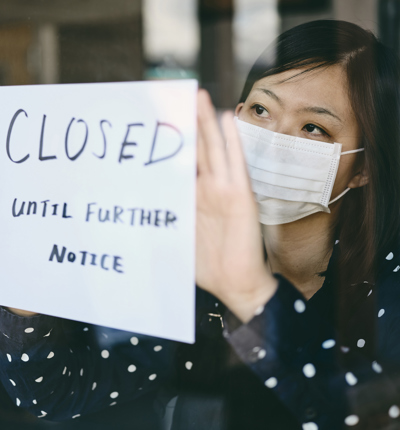
Business interruption insurance and the COVID-19 pandemic: Should insurers be obliged to pay out?
Jill Paterson and Megan George consider the latest development in a legal fight for compensation for businesses affected by the pandemic.
Posted on 17 November 2020
On 12 January 2020, the World Health Organisation (WHO) announced that a novel coronavirus had been identified in the Chinese city of Wuhan. The subsequent events are well known to all and have had a monumental impact on all aspects of our daily lives.
With news this week of a new vaccine which is reported to be around 95 per cent effective in treating the virus, many are hoping for corresponding good news when it comes to their livelihoods.
On 21 March 2020, the Health Protection (Coronavirus, Business Closure) (England) Regulations 2020 ("the 21 March Regulations") were introduced which provided for the closure of certain businesses including cafes, bars, pubs, restaurants, gyms, hairdressers, and most non-food shops. This was a devasting blow for many small to medium businesses who found themselves completely unable to continue trading.
However, many affected businesses had the benefit of business interruption insurance. This insurance is designed to pay out to a business in the event that it cannot trade owing to an unexpected event. In fact, many policies specifically included a ‘disease clause’ which purported to cover the business in the event of a notifiable disease.
Despite this, many struggling businesses reported that their insurers were refusing to pay out under their policy, arguing that the policies were not designed to cover such unprecedented circumstances and restrictions.
In September, the Financial Conduct Authority (FCA) brought a legal claim on behalf of many policyholders to ask the court to determine whether they should be indemnified for losses arising in the context of the Covid-19 pandemic and the advice of and restrictions imposed by the UK Government.
The court looked at several example clauses and found in favour of the FCA on the interpretation of the majority of these clauses. The FCA estimated that the judgment would affect around 700 types of policies and 370,000 policyholders.
As business owners breathed a sigh of relief, the insurers appealed the court’s decision to the Supreme Court. The hearing began on Monday 16 November and is due to last until Thursday 19 November, although it is not currently clear when the ruling will be issued.
What does this mean in practice for business owners? If the Supreme Court upholds the decision then many insurers will be obliged to pay out to businesses who have the benefit of business interruption insurance, provided they can provide evidence of their losses. This will be a welcome decision for those who have battled to survive the past few months and will signal a second light at the end of the 2020 tunnel.
With news this week of a new vaccine which is reported to be around 95 per cent effective in treating the virus, many are hoping for corresponding good news when it comes to their livelihoods.
On 21 March 2020, the Health Protection (Coronavirus, Business Closure) (England) Regulations 2020 ("the 21 March Regulations") were introduced which provided for the closure of certain businesses including cafes, bars, pubs, restaurants, gyms, hairdressers, and most non-food shops. This was a devasting blow for many small to medium businesses who found themselves completely unable to continue trading.
However, many affected businesses had the benefit of business interruption insurance. This insurance is designed to pay out to a business in the event that it cannot trade owing to an unexpected event. In fact, many policies specifically included a ‘disease clause’ which purported to cover the business in the event of a notifiable disease.
Despite this, many struggling businesses reported that their insurers were refusing to pay out under their policy, arguing that the policies were not designed to cover such unprecedented circumstances and restrictions.
In September, the Financial Conduct Authority (FCA) brought a legal claim on behalf of many policyholders to ask the court to determine whether they should be indemnified for losses arising in the context of the Covid-19 pandemic and the advice of and restrictions imposed by the UK Government.
The court looked at several example clauses and found in favour of the FCA on the interpretation of the majority of these clauses. The FCA estimated that the judgment would affect around 700 types of policies and 370,000 policyholders.
As business owners breathed a sigh of relief, the insurers appealed the court’s decision to the Supreme Court. The hearing began on Monday 16 November and is due to last until Thursday 19 November, although it is not currently clear when the ruling will be issued.
What does this mean in practice for business owners? If the Supreme Court upholds the decision then many insurers will be obliged to pay out to businesses who have the benefit of business interruption insurance, provided they can provide evidence of their losses. This will be a welcome decision for those who have battled to survive the past few months and will signal a second light at the end of the 2020 tunnel.


